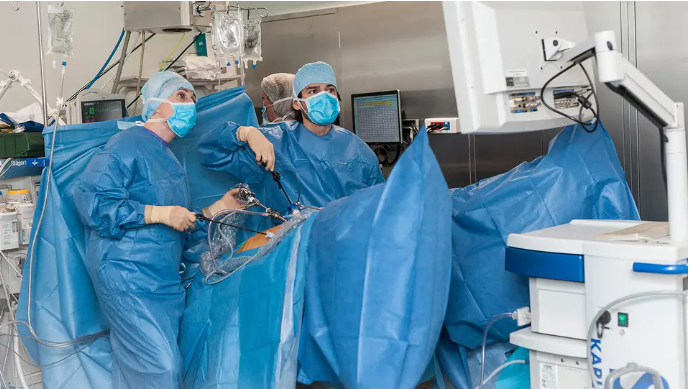—–This article is copied from MedpageToday
Removing both ovaries before menopause is associated with a higher likelihood of chronic health problems and reduced physical functioning years later, especially in women who underwent the surgery earlier, a cross-sectional study found.
Compared to an age-matched group, women under 46 who underwent premenopausal bilateral oophorectomy (PBO) for nonmalignant conditions-with or without hysterectomy-performed less well on a six-minute walk test administered in an outpatient clinic two decades later and were more likely to have chronic conditions:
Asthma: or 1.74 (95% CI 1.03-2.93)
Arthritis: or 1.64 (95% CI 1.06-2.55)
Obstructive sleep apnea: or 2.00 (95% CI 1.23-3.26)
Fracture: or 2.86 (95% CI 1.17-6.98)
“These results highlight the potential long-term negative effects of oophorectomy for women with benign or no ovarian indications who are at average genetic risk for ovarian cancer,” concluded researchers led by Michelle Mielke, MD, PhD, of the Wake Forest University School of Medicine in Winston-Salem, NC, in an article in Menopause. These results are important when considering whether to undergo ovariectomy (PBO) and hysterectomy.
Stephanie Faubion, M.D., M.B.A., medical director of the Menopause Society, said the findings, which rely on the Mayo Clinic’s Tubectomy and Aging Cohort Study-2 (MOA-2), confirm the need for clinicians to change their practices.
“This just adds to the existing literature that removing the ovaries at a younger age, especially under age 46, is associated with poor health outcomes,” Faubion told MedPage Today.” At this point, I think we just need to take action.”
Faubion, who is also director of the Center for Women’s Health at the Mayo Clinic in Rochester, Minnesota, but who was not involved in the current study, said that marrying later (women between the ages of 46 and 49) is also “not a good idea,” according to the study. In this group, there were increased odds of arthritis and sleep apnea compared with their age-matched peers, and PBO led to higher odds of chronic obstructive pulmonary disease in the entire cohort.
In the PBO group, about 90 percent also underwent a hysterectomy, and 6 percent had a hysterectomy prior to that; in the age-matched reference group that did not undergo PBO, 9 percent had a hysterectomy.
Mielke told MedPage Today that removing the ovaries during a hysterectomy (the second most common surgery for women) is a common practice for women, in part because it eliminates the risk of ovarian cancer.
“Historically,” Mielke explains, “it was believed that once the uterus was removed, there would no longer be the ability to reproduce, and therefore there would be no need to remove the ovaries.” However, over time, more and more research has shown that removing both ovaries before natural menopause may have long-term consequences or long-term risks of other diseases.
If ovaries are removed before natural menopause, Milk said, it’s “strongly recommended” that women remain on estrogen therapy until age 50.
The researchers noted that the current study included a comprehensive in-person physical assessment of women with a documented history of PBO, while other studies on PBO and health outcomes have relied primarily on passive collection of results from medical records, failing to capture “specific domains of bodily functioning or other measures related to aging.”
Study details
Mielke and colleagues used data from the Rochester Epidemiology Project’s (REP) Medical Record Linkage System and the MOA-2 study, which identified women in Olmsted County, Minnesota, who were treated with PBO for nonmalignant conditions between 1988 and 2007 and who were not at high risk for ovarian cancer.The MOA-2 participants were compared with a reference group of women who did not receive PBO were paired with a reference group of women who did not receive PBO.
As of 2018, when the face-to-face study began, the majority of those in the PBO and reference groups were still alive (91.6% and 93.1%, respectively).
The research team recruited 274 English-speaking women from MOA-2 who underwent in-person follow-up with PBO after a median of 22 years, including 161 patients who underwent the procedure early (before age 46) (59%) and 113 patients who underwent the procedure late (ages 46 to 49) (41%).
Participants had to be 55 years of age or older at enrollment and were excluded if pathology showed malignancy in their PBO or if they had not been seen in the REP in the past 5 years. They were age-matched to 240 participants in the reference group who did not have a PBO.
Overall, the women had a median age of 67 years, were 97%-99% white, and approximately 60% had never smoked.
Chronic diseases were assessed by medical records. In addition to the previously mentioned associations, the researchers did not find any associations between PBO and cancer, diabetes, dementia, hypertension, hyperlipidemia, cardiac arrhythmia, kidney, thyroid, or liver disease, osteoporosis, or transient ischemic attack.
Physical examination included measures of strength and mobility. Compared with the age-matched reference group, women who underwent PBO had a higher thyroid/pteronavicular fat ratio and performed poorly on the 6-minute walk test (-14 meters), whereas women who underwent early PBO performed better on the 6-minute walk test (-18 meters). Women in the late PBO group had higher mean percent fat mass, appendicular lean mass, and spinal bone mineral density compared with the reference group.
Mielke and colleagues noted that because the study was cross-sectional, causality could not be inferred, and longitudinal studies are recommended. They also noted that the women who participated in the study may have been healthier than the general population and pointed to the predominance of whites as one of the study’s limitations.
Hongguan care about your health.
See more Hongguan Product→https://www.hgcmedical.com/products/
If there are any needs of medical comsumables, please feel free to contact us.
hongguanmedical@outlook.com
Post time: Sep-18-2023


